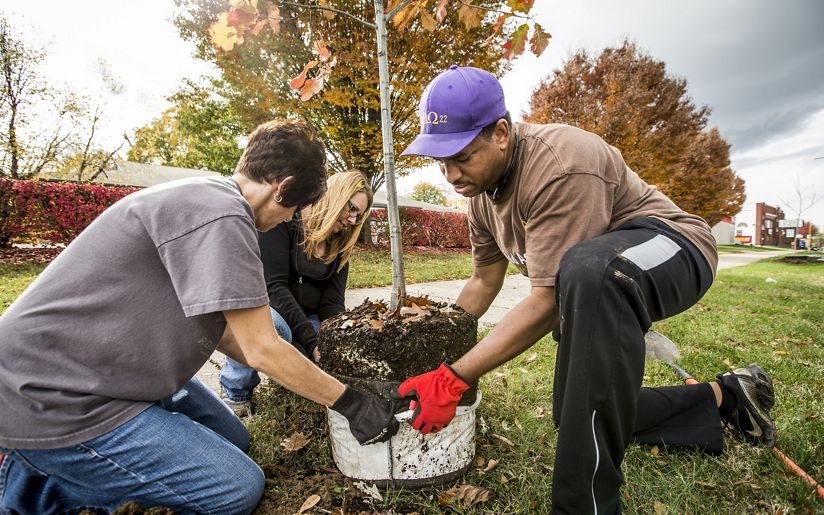- About
- Topics
- Picks
- Audio
- Story
- In-Depth
- Opinion
- News
- Donate
- Signup for our newsletterOur Editors' Best Picks.Send
Read, Debate: Engage.
| November 19, 2015 | |
|---|---|
| topic: | Climate action |
| tags: | #climate change, #deforestation, #Eden Restoration Project, #Republic of change |
| located: | Madagascar |
| by: | Debra Atlas |
Natural filters, trees help clean the air and provide life-giving oxygen. They help stabilize rivers, prevent stormwater runoff and soil erosion, slow water evaporation and provide a canopy and habitat for wildlife.
One of the most important benefits trees provide is the ability to capture and sequester large amounts of carbon dioxide (CO2). One tree can soak up 25 kg. of CO2., equal to about two days worth of driving.
According to the United Nations, NASA, NOAA, and IPCC, “trees are the most reliable technology we have available right now to sequester CO2 and curb climate change.”
One organization - Republic of Change - has taken on reforestation in a way it hopes will empower people to address climate change.
The company's goal is to plant 1 billion trees to fight against climate change and to drive the culture of sustainability. With that in mind, on October 6th it launched a crowdfunding campaign to “hack climate change”.
The campaign's goal is to plant 100,000 mangrove trees in Madagascar, an island off Africa in the Indian Ocean. Planting will take place between January 6th and March 25th, 2016 via the Eden Restoration Project, which to date has planted over 100 million trees.
The choice of trees was simple. Mangroves absorb 400 percent more CO2 than deciduous trees, have a high survival rate and they increase both land and marine biodiversity.
Julien Fruchier, Republic of Change's founder, says the majority of us don't know what to do or where to start when it comes to dealing with climate change.
The issue right now, he says, is we have CO2 in the atmosphere causing our climate to change. “We need to focus on extracting that while we're transitioning to a renewable economy.”
Fruchier says, “there's no reliable technology outside of trees to sequester CO2 from the atmosphere.”
We currently have a deficit of eleven billion trees per year, he said.
“We're still down 50 percent from 100 years ago,” said Fruchier. “We need to be at least at break even. It's the one thing that has an impact.”
In 2005, while part of an oil and gas company, Fruchier read an article on what the world would look like if we didn't avert the problem of climate change. Wanting to be part of the solution, he realized that “climate change is a massive problem.” From his perspective, the bigger the problem, the bigger the opportunity.
Since incorporating Republic of Change in 2010, Fruchier has been running experiments in how to engage average citizens to help solve climate change. Although he's glad politicians are taking this as a serious issue, he stresses that “we're making a grave mistake by putting our collective fates in hands of politicians.”
“It comes back to us as individuals,” he said.
“It's about bringing a number of people that are philosophically aligned together to do something about the most pressing issue of our time,” said Fruchier.
But it's not about planting trees, at least not only that. It's about empowering humanity “to tackle this polarizing, very challenging issue that effects all 7.3 billion of us.” And it's startlingly easy to participate in this innovative solution.
“A 12 year old with an allowance can be part of (this) campaign for just $1.00,” Fruchier said. The campaign is designed to be enticing, fun and economical. And there are a variety of “perks” for the various levels of pledges, many of which have nothing to do with trees but everything to do with addressing climate change.
For example, a documentary film and a Mastermind course are associated with this campaign. The film's collaborator is Lawrence de Lam, the writer / director of the film “Not Business as Usual”. The as-yet untitled documentary, which begins filming in 2016, will address “the cultural revolution taking place to create a new, more sustainable operating system for the world.”
Documentary-related perks include people having their name in the credit reel, being interviewed and featured on social media, etc.
The Mastermind course is geared primarily for businesses and those of influence. A pledge of $500 or more will get you a seat at this table. Participants will “meet” quarterly via conference call.
Already a number of businesses have pledged at this level. Many are members of 1% for the Planet, B Corporations or are part of Green America. Mastermind course members will engage in discussions on how to solve the problem through means available to us, says Fruchier, “to (proactively) make a more substantial difference or impact on climate change.”
Fruchier says. “Good intentions aren't going to fix the problem. Taking action (will).”
The campaign is already almost 50 percent funded. The average pledge has exceeded all expectations – from $20.00 to $58.00, with many in the $100 to $5,000 range.
Unlike other crowdfunding campaigns, all funds pledged here will go to Republic of Change's efforts even if the campaign doesn't reach its goal. But the campaign's success makes a difference as to the number of trees that will be planted.
To make a pledge, go to https://www.indiegogo.com/projects/let-s-sort-out-climate-change#
If you are up to creating your own documentary film, here is a well written, detailed guide for visual creatives and storytellers: https://www.jenreviews.com/how-to-make-a-documentary/
By copying the embed code below, you agree to adhere to our republishing guidelines.
